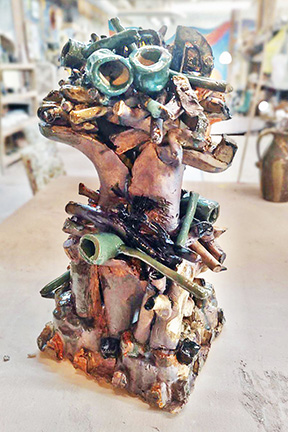Sculptor Robert Gulley had fallen on hard times.
The 77-year-old Veteran lived alone in a small rural town in Illinois. He was having trouble with alcohol and his arthritis made it extremely painful for him to walk.
Because of his pain, Gulley began living in his car last year. He parked it in his driveway and drove to get his meals from fast food drive throughs. He had little contact with the outside world and was sitting for so long in his driver’s seat that he developed ulcers, wounds and infections. He couldn’t take any of his prescribed medications or reach his belongings as they were inside his home. Over time, it became agonizing for him to even drive.
In January, VA provider Dr. Anuja Vallabh called Gulley after he had been referred to her for his alcohol use disorder. Vallabh works as a remote provider for VISN 12’s Clinical Resource Hub. Through her check-ins, she soon learned that Gulley was living in his car.
Vallabh scheduled Gulley a consultation appointment for a residential rehabilitation facility. Gulley agreed to go but he didn’t show up. When Vallabh followed up, Gulley would again agree to go but not show, and he would refuse offers of transportation or additional support. After weeks of follow-ups, Vallabh could hear just how ill he was becoming. She became very worried. Still, Gulley pleaded for “just one more day” before she intervened.
“I didn’t think he would make it through the weekend,” Vallabh said.
Vallabh made the difficult decision that day to call adult protective services. An ambulance came to take Gulley to the hospital. At that point, Gulley, who stands over six feet tall, weighed only 127 pounds.
The sculptor
Gulley served as a radio operator during the Vietnam War. When he returned, he followed his passion and studied fine arts with help from the G.I. Bill. He apprenticed with Richard Hunt, a legendary sculptor and civil rights ambassador, for two years while he honed his own sculpting skills. He then moved to New York to pursue a Master of Fine Arts.
Gulley began working in construction in Manhattan to earn money, but he always found time to sculpt. He drew inspiration from his time with Hunt and from Vietnam. Sculpting served as a form of therapy for him, as he had experienced panic attacks after his military service.
His sculptures have been featured in The New York Times and other news outlets. In 2014, Gulley competed against 5,500 artists and won first place for his sculpture “Prairie Fire” in the National Veterans Creative Arts competition.
After four decades in New York, Gulley retired and moved to his current home in Illinois. He would regularly drive 90 minutes each way to the nearest VA facility to receive care. He didn’t mind the long trip as he was a member of a ceramics studio near the facility.
Eventually, as his pain worsened, he stopped going to in-person appointments, halted visits to the ceramics studio and began to isolate himself.
The provider
Vallabh is a clinical pharmacist practitioner with a specialty in mental health and substance use disorders at VA’s Clinical Resource Hub in VISN 12. She works remotely to support VA facilities in Wisconsin, Illinois, Indiana and Michigan when they need a specialist or extra coverage.
She mostly meets with Veterans through VA Video Connect, VA’s secure videoconferencing app. Sometimes these appointments take place over the phone if a Veteran has limited access to a tablet or computer, like with Gulley.
It was during one of these phone calls that she realized the severity of Gulley’s situation. Her actions that day may have saved Gulley’s life. “He is somebody who is just so likable, so kind and I felt so bad that he was alone and going through all of this,” she said.
Gulley has expressed gratitude for the actions Vallabh took that day and her persistence in care throughout the prior months.
Staying connected with telehealth
Gulley did go to a rehabilitation facility and celebrated three months of sobriety. He is also walking again with support from a walker and gaining back his weight.
“I am glad to be alive,” Gulley said. “I’m doing better.”
For more information on telehealth resources, visit VA Telehealth Services.
Topics in this story
More Stories
Face it, muscle tension is not good for your health, but you can do something about it in 15 minutes!
For a group of Veterans at the Central Virginia VA Health Care System, Parkinson’s care includes a regular check-in to see what they’ve built with Legos.
Daughter and son-in-law find a diary of her father's life as a prisoner of war written on toilet paper.







I’m a Vietnam veteran who recently been advised that I have clogged arteries and unable walk far. I would love to apply for an ebike if possible. Thanks for your consideration in this matter.